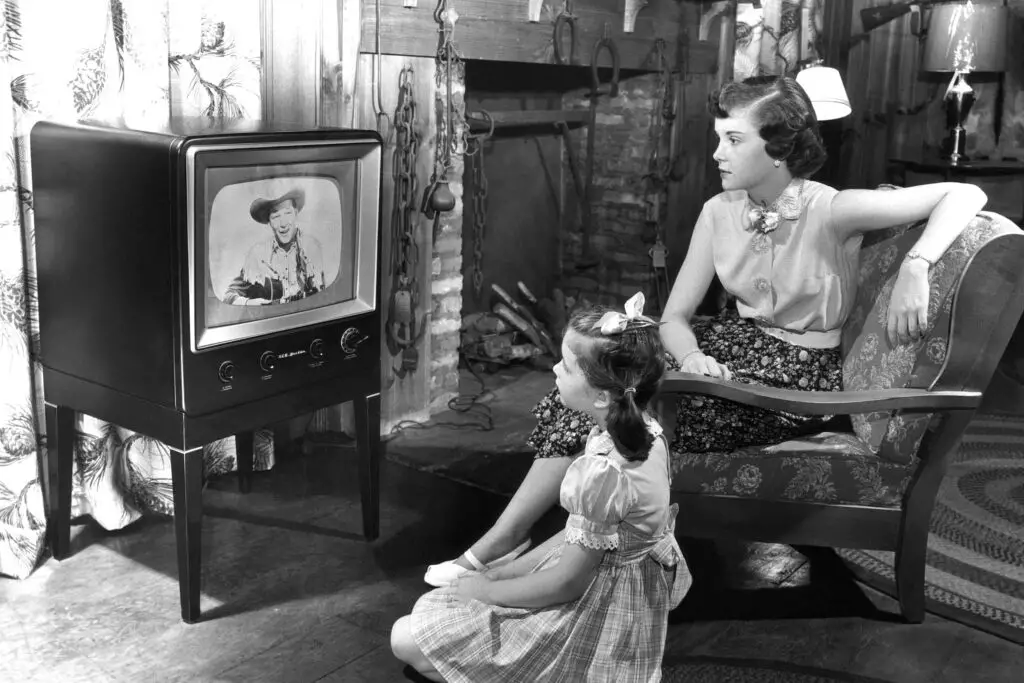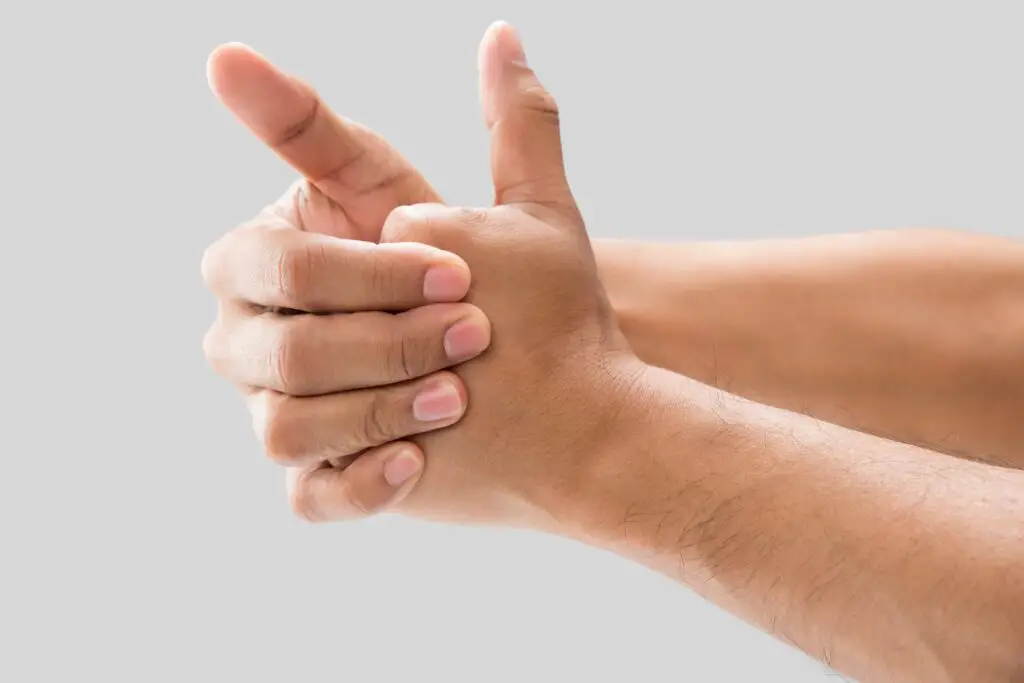1. “You’ll Go Blind if You Sit Too Close to the TV”

For generations, sitting too close to the television was a surefire way to damage your eyes, or so the story went. Parents and grandparents warned us about the potential risks, including permanent eye damage and even blindness. However, modern science has debunked this myth. Experts have clarified that while sitting too close to the TV might cause eye strain or discomfort, it doesn’t lead to any lasting damage. The American Academy of Ophthalmology has confirmed that our eyes simply adjust to the screen distance, and prolonged screen time can contribute to digital eye strain, but not permanent harm.
The fear of eye damage seems to have originated when televisions had lower resolution and were harder on the eyes. In reality, the more pressing concern today is the impact of excessive screen time on our health, including issues like dry eyes and difficulty focusing. But don’t worry—your eyes won’t go blind just from sitting a little too close to your TV. Still, it’s always a good idea to take regular breaks!
2. “Cracking Your Knuckles Will Give You Arthritis”

How many times did you hear that cracking your knuckles would give you arthritis? For years, this myth spread like wildfire, causing us to feel guilty every time we made those popping sounds. Well, according to doctors, this is simply not true. Research has shown that cracking your knuckles does not increase the risk of developing arthritis. The noise you hear is caused by gas bubbles popping in the joints, and while it might annoy those around you, it doesn’t harm your joints or cartilage.
In fact, a study conducted by Dr. Donald L. Unger, who spent 60 years cracking only his left hand’s knuckles, found no difference in arthritis development between the hands. So, while it may be annoying to some, cracking your knuckles doesn’t cause arthritis. You’re safe to pop away without worrying about your joints!
3. “If You Go Outside with Wet Hair, You’ll Catch a Cold”

This warning has been passed down through generations, with many grandparents swearing that leaving the house with wet hair could invite a cold. However, this myth has been debunked by medical professionals. Colds are caused by viruses, not by temperature or wet hair. The real risk of getting sick comes from being exposed to those viruses, which spread through airborne droplets when someone is sick.
While it’s true that exposure to cold weather can stress your immune system, there’s no direct link between going outside with wet hair and catching a cold. So, unless you’re standing outside in freezing conditions for hours, don’t worry about that damp hair—just be cautious about washing your hands and avoiding sick people to keep colds at bay.
4. “Eating Candy Will Give You Cavities”

Grandparents were notorious for warning us about the dangers of sugar, especially when it came to sweets like candy. They told us that eating too much candy would inevitably lead to cavities. While it’s true that sugary foods can contribute to cavities if oral hygiene is neglected, candy itself isn’t the sole culprit. Cavities occur when bacteria in the mouth break down sugar, creating acids that erode tooth enamel.
The key factor in preventing cavities is brushing your teeth regularly, flossing, and maintaining a balanced diet. So, while indulging in candy now and then might not be great for your teeth, it’s the overall oral care routine that matters most. And don’t forget: visiting the dentist regularly will help prevent any long-term issues.
5. “You Can’t Swim After Eating, You’ll Cramp Up and Drown”

Every summer, we were told to wait at least an hour after eating before jumping back into the pool to avoid cramps. The myth was that digesting food and swimming at the same time would cause stomach cramps so severe that we might even drown. However, this idea has been proven untrue by experts. While swimming on a full stomach might feel uncomfortable, it doesn’t pose a life-threatening danger. The risk of cramping is minimal, and it’s highly unlikely that someone would drown from it.
The truth is, your body is capable of handling digestion and physical activity simultaneously. While you may feel a little sluggish after a heavy meal, there’s no scientific evidence to suggest that you should avoid swimming altogether. So go ahead and take that swim after lunch—just don’t overdo it and give your body a chance to digest!
6. “If You Make a Face, It’ll Stay That Way”

One of the classic warnings we heard as kids was that making funny faces would cause our expressions to be permanently stuck. Whether we were sticking out our tongues or scrunching up our noses, we were cautioned that such behavior could lead to lifelong facial expressions. While this may have been a way to keep us from making faces at the dinner table, there’s no truth to it. Our facial muscles are quite flexible, and making an expression doesn’t freeze it for good.
Facial muscles can become accustomed to certain expressions, which is why some people may develop more pronounced lines or wrinkles over time, but it’s not because their face was “frozen” by making a silly expression. So go ahead—make all the faces you want. Your muscles will return to their usual positions.
7. “If You Don’t Eat Your Veggies, You Won’t Grow Big and Strong”

Many of us grew up hearing the stern reminder to eat our vegetables so we could grow big and strong. While vegetables are packed with essential vitamins and nutrients that contribute to overall health, they aren’t the magical growth boosters they were made out to be. Growing tall and strong is more about genetics and maintaining a balanced diet, including proteins, fats, and carbohydrates, rather than solely relying on vegetables.
That said, vegetables are definitely important for a well-rounded diet and provide necessary nutrients like fiber, vitamins, and minerals. So while they may not be the key to growing an extra few inches, they are essential for your health and well-being. Eat your veggies, but don’t worry if they don’t turn you into a giant.
8. “Shaving Will Make Your Hair Grow Back Thicker”

How many times did we hear that shaving our legs or faces would cause the hair to grow back thicker, darker, or faster? This myth has been debunked by dermatologists. Shaving doesn’t affect the hair’s thickness or growth rate. Hair may appear thicker after shaving because the razor cuts it at an angle, making the ends feel blunt or coarse. However, this doesn’t change the hair’s natural growth pattern.
Hair growth is determined by genetics and hormones, not shaving. So, if you’ve been worried about shaving your legs or face, there’s no need to be concerned about thicker hair. You can shave without fearing the dreaded “stubble effect”—your hair will return to its usual texture and thickness.
9. “If You Keep a Dog Inside, It’ll Get Fleas”

As children, we were often warned that keeping a dog indoors would invite fleas into the house. But it turns out, fleas don’t just magically appear inside because your dog is indoors. Fleas are more likely to hitch a ride from outdoor environments, such as grassy areas, where other animals may be present. While it’s true that dogs can carry fleas inside, the solution is regular flea prevention, not avoiding indoor living.
Indoor dogs can still get fleas if they come into contact with outdoor animals or environments. The good news is that with proper flea treatments and regular grooming, your dog will stay flea-free, no matter where it spends its time. So don’t worry—keeping your dog indoors isn’t the problem.
10. “If You Touch a Frog, You’ll Get Warts”

For many, frogs were a feared creature thanks to the age-old myth that touching them would cause warts. In reality, warts are caused by a virus, not by frogs. The wart-causing virus, called the human papillomavirus (HPV), spreads through direct contact with infected skin, not from animals. Frogs might have rough skin, but they don’t carry the virus that causes warts.
This myth likely originated from the fact that frogs have bumpy skin, which might resemble the appearance of warts. While it’s a good idea to wash your hands after touching animals, touching a frog won’t result in warts. So, feel free to admire these amphibians without fear!
11. “If You Eat Popcorn Too Fast, You’ll Get a Stomach Ache”

Many of us were warned that eating popcorn too quickly would lead to a painful stomach ache. While overeating or eating too quickly can sometimes cause discomfort, there’s no specific evidence that popcorn is any more likely to upset your stomach than other foods. Popcorn is high in fiber, and eating a large amount too fast can lead to bloating, but it won’t cause a stomach ache in the way that was once feared.
The key to enjoying popcorn without discomfort is moderation. Eating slowly and savoring each bite is always a good practice for avoiding bloating and discomfort. So next time you’re watching a movie, go ahead and enjoy that popcorn—just don’t overdo it!
12. “If You Swallow Gum, It Stays in Your Stomach for Seven Years”

It’s a tale that many of us heard as children: if you swallow gum, it’ll stay in your stomach for seven years. The truth is, gum doesn’t linger in your stomach. While your body doesn’t digest it, it does pass through your digestive system in the same way that other indigestible materials do. It’s eventually excreted in your stool.
The myth likely arose due to the fact that gum is made from synthetic materials that don’t break down in the body. However, it doesn’t “stick around” in your stomach. So, if you swallow a piece of gum, there’s no need to panic. Your digestive system will take care of it in due time.
13. “You Can’t Get Pregnant If You’re on Your Period”

For many years, the myth persisted that women couldn’t get pregnant while on their period. This idea has been widely debunked. While the chances of getting pregnant during your period are lower, it is still possible. Sperm can live in a woman’s reproductive system for up to five days, so if you have a short cycle and ovulate shortly after your period, sperm could still be present when you’re most fertile.
Contraception is the only reliable way to prevent pregnancy, regardless of your cycle. So, while it might not be the most likely time for conception, never rely on the idea that you can’t get pregnant during your period.
